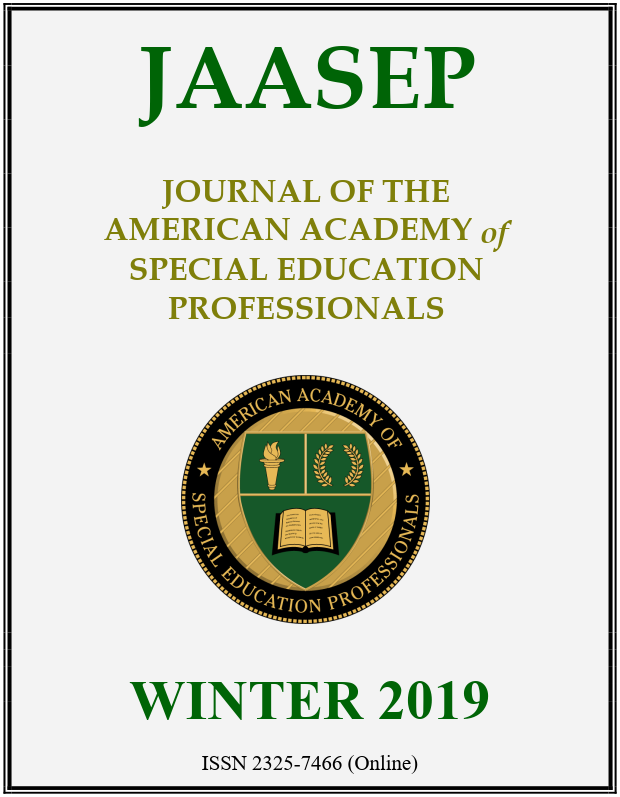Social Skills for Students with Moderate to Severe Disabilities: Can Community Based Instruction Help?
Alberto, P., Cihak, D., & Gama, R. (2005). Use of static picture prompts versus video modeling during simulation instruction. Research in Developmental Disabilities, 26, 327-339. DOI: https://doi.org/10.1016/j.ridd.2004.11.002
Bouck, E. C. (2010). Reports of life skills training for students with intellectual disabilities in and out of school. Journal of Intellectual Disability Research, 1093-1103. DOI: https://doi.org/10.1111/j.1365-2788.2010.01339.x
Branham, R., Collins, B., & Schuster, J. (1999). Teaching community skills to students with moderate disabilities: Comparing combined techniques of classroom simulation, videotape modeling, and community-based instruction. Education & Training in Mental Retardation & Developmental Disabilities, 34(2), 170-181.
Creswell, J. W. (2002). Educational research: Planning, conducting, and evaluating quantitative and qualitative research. Prentice Hall.
De Bildt, A., Serra, M., Luteijn, E., Kraijer, D., Sytema, S. and Minderaa, R. (2005), Social skills in children with intellectual disabilities with and without autism. Journal of Intellectual Disability Research, 49: 317–328. DOI: https://doi.org/10.1111/j.1365-2788.2005.00655.x
Dipipi-Hoy, C., Jitendra, A., & Kern, L. (2009). Effects of Time Management Instruction on Adolescents' Ability to Self-Manage Time in a Vocational Setting. The Journal of Special Education, 43(3), 145-159. DOI: https://doi.org/10.1177/0022466908317791
Dukakis, N., Valkanos, E., & Brinia, V. (2013). Adult vocational training and the project technique. Industrial and Commercial Training Ind and Commercial Training, 45(2), 99-109. DOI: https://doi.org/10.1108/00197851311309543
Kerns, C., Kendall, P., Berry, L., Souders, M., Franklin, M., Schultz, R., Herrington, J. (2014). Traditional and Atypical Presentations of Anxiety in Youth with Autism Spectrum Disorder. J Autism Dev Disord Journal of Autism and Developmental Disorders, 44, 2851-2861. DOI: https://doi.org/10.1007/s10803-014-2141-7
Langone, J., Langone, C., & McLaughlin, P. (2000). Analyzing Special Educators' Views on Community-Based Instruction for Students with Mental Retardation and Developmental Disabilities: Implications for Teacher Education. Journal of Developmental and Physical Disabilities, 12(1), 17-34. DOI: https://doi.org/10.1023/A:1009452009831
Lowrey, K., Drasgow, E., Renzaglia, A., & Chezan, L. (2007). Impact of Alternate Assessment on Curricula for Students with Severe Disabilities: Purpose Driven or Process Driven? Assessment for Effective Intervention, 32(4), 244-253. DOI: https://doi.org/10.1177/15345084070320040601
Pickens, J., & Dymond, S. (2014). Special Education Directors' Views of Community-Based Vocational Instruction. Research and Practice for Persons with Severe Disabilities, 290-304. DOI: https://doi.org/10.1177/1540796914566713
Roessler, R., & Foshee, K. (2010). Impact of Occupational Instruction on the Performance and Vocational Identity of Special Education Students. Rural Special Education Quarterly, 29(3), 23-28. DOI: https://doi.org/10.1177/875687051002900305
Siperstein, G., Glick, G., & Parker, R. (2009). Social Inclusion Of Children With Intellectual Disabilities In A Recreational Setting. Intellectual and Developmental Disabilities, 47(2), 97-107. DOI: https://doi.org/10.1352/1934-9556-47.2.97
Steere, D., & DiPipi-Hoy, C. (2012). When You Can't Get Out Strategies for Supporting Community-Based Instruction. Teaching Exceptional Children, 45(2), 60-67. DOI: https://doi.org/10.1177/004005991204500208
Walker, A., Uphold, N., Richter, S., & Test, D. (2010). Review of the Literature on Community-Based Instruction across Grade Levels. Education and Training in Autism and Developmental Disabilities, 45(2), 242-267.
Walton, K., & Ingersoll, B. (2013). Improving Social Skills in Adolescents and Adults with Autism and Severe to Profound Intellectual Disability: A Review of the Literature. Journal of Autism and Developmental Disorders, 43, 1-22. DOI: https://doi.org/10.1007/s10803-012-1601-1
Zion, E., & Jenvey, V. (2006). Temperament and social behaviour at home and school among typically developing children and children with an intellectually disability. Journal of Intellectual Disability Research J Intellect Disabil Res, 50(6), 445-456. DOI: https://doi.org/10.1111/j.1365-2788.2006.00790.x
Downloads
Article Information
- Article Type Articles
- Submitted December 30, 2018
- Published February 15, 2019
- Issue Winter 2019
- Section Articles
